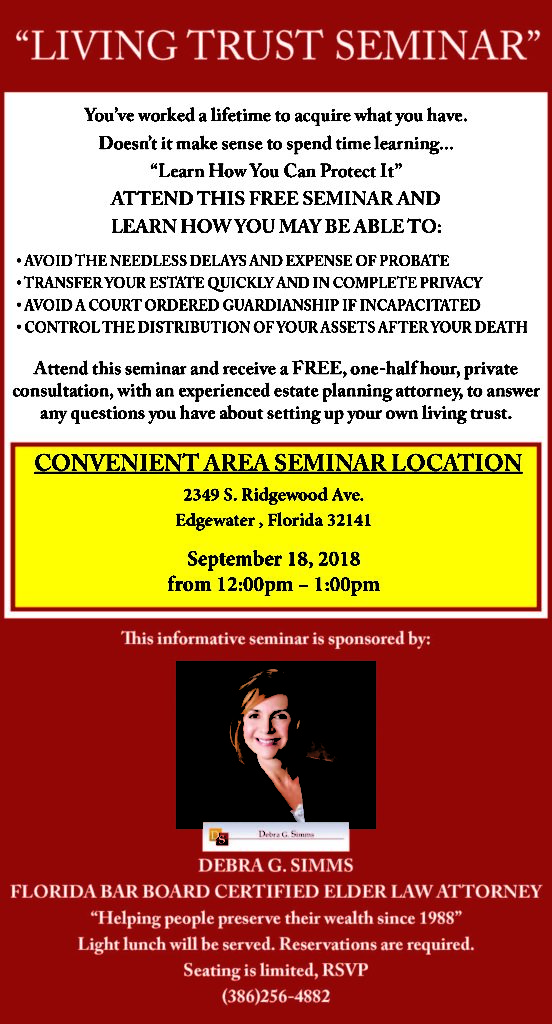
Tag Archives: Living Trust
Is Your Will a Private Document? NO!
In Florida, a Will must be filed with the Clerk of Court in the county where you are residing at the time of your death. A Will is a public record. Other documents that must be filed during the probate process are the Inventory and Accounting-documents which contain very specific information about your assets.
This issue was recently in the news when The New York Times filed a lawsuit seeking access to the sealed Will of Harper Lee, author of To Kill a Mockingbird. The Times argued that “Ms. Lee’s privacy concerns were no different from those of others whose wills are processed through the court system.” The Times won, and Harper Lee’s Will is now a public record.
You can avoid this public process and keep your affairs private through the use of a Revocable Living Trust. Like a Will, a Trust’s main purpose is to control the disposition of your property at death, But, unlike a Will, one of the advantages of a Trust is that there is no Probate and no public airing of your assets in a filed Inventory.
With a Revocable Living Trust, your property and their values remain private.
Questions? The Law Office of Debra Simms is here to help. Call us today 386.256.4882
Many of my clients live in a Manufactured Home. They are concerned about how to avoid Probate if the home is not titled jointly. Probate is certain to be required if you are not leaving the home to your spouse, all children equally, or if your children cannot amicably agree among themselves upon a division of this asset. You will also need a Probate if your estate has any debts.
A solution for this problems is to put your Manufactured Home in a Revocable Living Trust. First, of course, you must contact an attorney to create a trust for you if you do not already have one. Then, you must contact the Florida Department of Motor Vehicles to change the registration. There are forms to fill out and processing fees to pay, but the process is relatively easy and much less expensive than Probate.
If the Manufactured Home is your Homestead, you will not lose this valuable exemption simply by putting it in a Trust.
Also, sometimes the owner also owns the land underneath the Manufactured Home. If this is the case, then a deed will also need to be prepared and filed with the Clerk of Court. If you own the land, another option is to “retire” the title to the mobile home by filing certain documents with the Clerk of Court and the Department of Motor Vehicles. If this step is taken, the mobile home can be transferred by deed to the trust.
Taking the above steps will give you some peace of mind in protecting your beneficiaries from Probate. It will save your beneficiaries time and large legal fees, and allow for the smooth transitions of your assets
Most people are not aware of the value of a certified estate planning attorney. Most people generally believe they have planned well if they have a will in place. A will may not be the best plan because a will does not avoid probate when you die. Interesting fact: a will must be examined by the probate court judge before it can be admitted to probate. A defective will not be accepted and your estate will be administered as though you don’t even a have a will!
Basic estate planning definitions:
- Will – Only goes into effect when you die. It is a legal document that names the beneficiaries who inherit a person’s assets and names a representative to administer and distribute the estate.
- Probate – Legal process used by the court to ensure debts are paid and assets distributed in accordance to your will. If you don’t have a valid will your assets are distributed according to state law.
- Living Trust – Legal document, similar to a Will in that it contains your instructions for what you want to happen to your assets when you die; however, it avoids probate at death because your assets pass to a trustee and then to your beneficiaries; an additional advantage is that it can provide for control of your trust assets while you are alive which prevents the court from controlling your assets if you become incapacitated. In other words, a living trust which provides for incapacity can avoid a Guardianship proceeding whereby you would become a Ward of the State!
The Simms Law Firm recommends a simple and proven alternative to a will which is the revocable living trust. It avoids probate and lets you keep control of your assets while you are alive- even if you become incapacitated – and after you die.
So what is the downside of probate?
Four simple points really.
● Expensive – Legal/executor fees and other costs have to be paid before assets can be fully distributed to your heirs.
● Time – Probate can take six months to two years to process an estate. Nothing can be distributed or sold without court and/or executor approval. Tough break if your family needs the funds for living expenses.
● No privacy – Probate is a public process. That means “interested parties” cull these notices and can slow down the process to contest the will.
● No control – The process is tied up internally in the court process – this takes the whole process out of your hands. Courts move slowly because of the court calendar; public information and claims on the estate.


